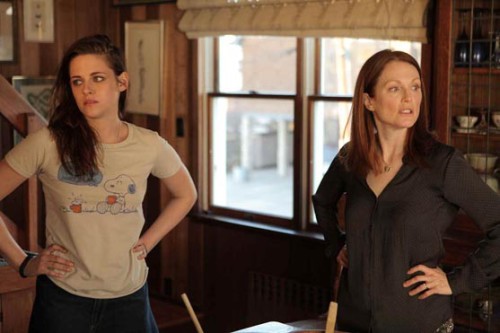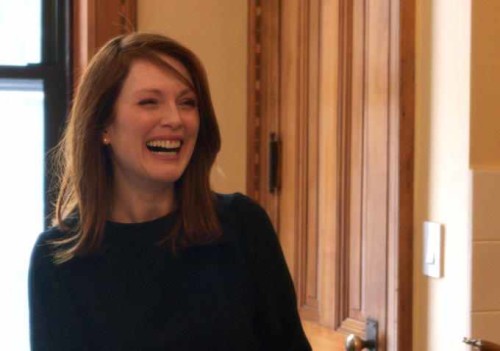Written by Ren Jender.
Like apparently many others, I was avoiding this year’s blindingly white “boy” and “man”-centered Academy Awards, so I missed seeing Julianne Moore win the Oscar as Best Actress for her performance in Still Alice. Instead, at the suggestion of Indiewire’s Women and Hollywood I was on my way to see a film with a woman protagonist: Still Alice. I didn’t have a lot of choices. I’d already seen Wild, Two Days, One Night, and Ida and had no desire to see Gone Girl; the only other films about women nominated for major awards. I ended up going right back home: the theater was closed for emergency roof repair. When I saw the film the next Sunday, I thought maybe I should have taken the previous week’s circumstances as a sign.
I had been curious to see what the filmmakers would do with this adaptation of the Lisa Genova novel. The writer-directors are a married gay male couple (Wash Westmoreland and Richard Glatzer) who not only made the underrated Quinceañera (the rare film about Chicanos that doesn’t have a white savior or even a white main character), but also live with the relatively recent ALS diagnosis of Glatzer (whose disease has progressed enough that he can’t speak or eat without assistance). While ALS is not the same as the Early Onset Alzheimer’s Disease the title character has in Alice I thought Glatzer’s experience might give the film more insight than the usual able-bodied writer and director’s view of disability. What I didn’t expect from this film was how mild and polite it is about the challenges and loss Alice (Moore) faces.
As an expert on dementia writes, we should feel a lot more tension in the final diagnostic test Alice takes (and fails) because the stakes are so high. Similarly when one of Alice’s children is found to have the gene that means a 100 percent chance of developing the disease as well, we hear a phone call and then… nothing else, not even a hint, in later scenes, of how this information would affect the way an adult child would see and react to the deterioration of a parent.

The only fire in this film are the interactions between Alice and her youngest daughter Lydia (played by Kristen Stewart in a performance that reminded me of her meaty roles in Adventureland and The Runaways). In a family of over-achieving professionals (brother Charlie is in med school, sister Anna is a lawyer), Lydia is a struggling actress who has always had a prickly relationship with her Type-A, college professor mother (even after she is diagnosed, Alice continues to teach at Columbia and prepares, alone, the entire Christmas dinner, from scratch, for the whole family).
After Alice has to leave her job, she tells Lydia all the things she wants to see while she can still take them in, ending with, ” I want you to go to college.”
Exasperated, Lydia tells her, “You can’t just use your situation to get everything you want.”
As anyone who has had family members who need care can attest, sometimes the people who step up and help can be as surprising as the ones who are suddenly “too busy” to stop by. Lydia is the one who asks her mother (as Alice again prepares food for the whole family–even moderately advanced Alzheimer’s can’t save women from doing all the work in the household) to describe what she is experiencing. Alice wears a “memory impaired” medical bracelet but also has moments of clarity. She answers, “I can see the words hanging in front of me and I can’t reach them.” Then she adds, “Thanks for asking.” If the film had made these two characters its main focus it could have been a worthy successor to Quinceañera and the unlikely, symbiotic duo at its core: a pregnant teenager and her macho, closeted, gay cousin.
[youtube_sc url=”https://www.youtube.com/watch?v=ZrXrZ5iiR0o” iv_load_policy=”3″]
Equally disappointing is Queen and Country, the latest–and what is being billed as the “final”–film, from 82-year-old writer-director John Boorman, whose long career includes Excalibur (probably due for a revival since its medieval setting is so much like Game of Thrones–and it features a young Helen Mirren) and the film to which Queen is a belated sequel, 1987’s great, autobiographical comedy, set in World War II London, Hope and Glory.
Queen begins with one of the closing scenes of Glory in which 9-year-old Bill, the director’s stand-in, finds, after an idyllic summer in his Grandfather’s house on the Thames, his friends dancing around the school building, on fire after the Germans bombed it. The opening day of school is postponed. “Thank you, Adolph,” says one of Bill’s friends as he smiles and looks to the sky.

Queen jumps to a decade later, when Bill is conscripted into the British Army to serve what was then the requirement of two years duty. Although Callum Turner (Glue) as Bill is physically believable as a grown-up version of Sebastian Rice-Edwards, who played Bill in Glory, he lacks the earlier Bill’s watchfulness: seeing his older sister let her boyfriend into her bedroom through her window or overhearing his mother and friend-of-the-family Mac talk about their romance (which predates and overlaps both their marriages). The earlier film was through young Bill’s eyes but we saw clearly into the lives of the other characters, especially the women and girls in the family.
This time around we are, for most of the action, stuck with just Bill and his erratic, “immoral” army friend Percy (Caleb Landry Jones, grating in a poorly conceived role) as they try, in small ways, to sabotage the small-mindedness and tedium of non-combat army life. They teach typing to fellow conscripts but stray from the official lesson plan, dictating to the class “Arses. a-r-s-e-s.” They conspire with Redmond (Pat Shortt playing the role of the funny Irish friend, which, in British productions has historically been the equivalent of the funny Black friend in American movies and TV) to get back at the officers who constantly malign them.
They also try to pick up women. After a double date with two nurses, Percy and Bill try to peep, Animal House-style, into the nurses’ dorm. Percy on the shoulders of Bill sees a more realistic scene than Animal House’s topless pillow fight: women in curlers and practical bathrobes but tells Bill he’s seeing “20 student nurses in various states of undress.” When Bill gets on Percy’s shoulders one of the nurses they went out with, Sophie (Aimee-Ffion Edwards) sees him and slides down her dress to press her bare breast to the window pane.
Bill pursues an upper-class older woman (of 24!) “Ophelia” (Tamsin Egerton playing a badly written role in the woman-with-psychological-problems mold) while Percy makes a connection with Bill’s married sister Dawn (Vanessa Kirby, every bit as irritating as Jones. She’s no match for the original Dawn, the sublime Sammi Davis). Bill’s other sister never appears or is mentioned. In the mother’s big scene she and Bill have a conversation about her affair that is two sentences long–as if Boorman wanted to remind us of her infidelity, but wasn’t quite sure why. After two long hours the film comes to its conclusion just as Alice does, not with a bang but a whimper.
[youtube_sc url=”https://www.youtube.com/watch?v=y5oVLWqRSUU” iv_load_policy=”3″]
Ren Jender is a queer writer-performer/producer putting a film together. Her writing. besides appearing every week on Bitch Flicks, has also been published in The Toast, RH Reality Check, xoJane and the Feminist Wire. You can follow her on Twitter @renjender
